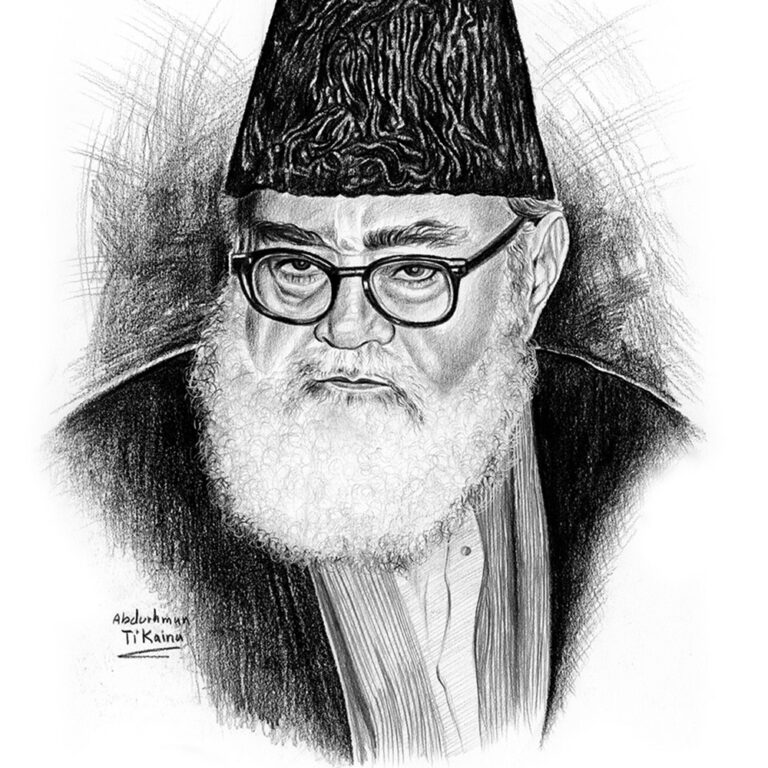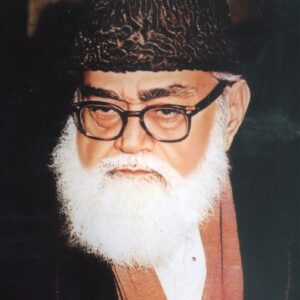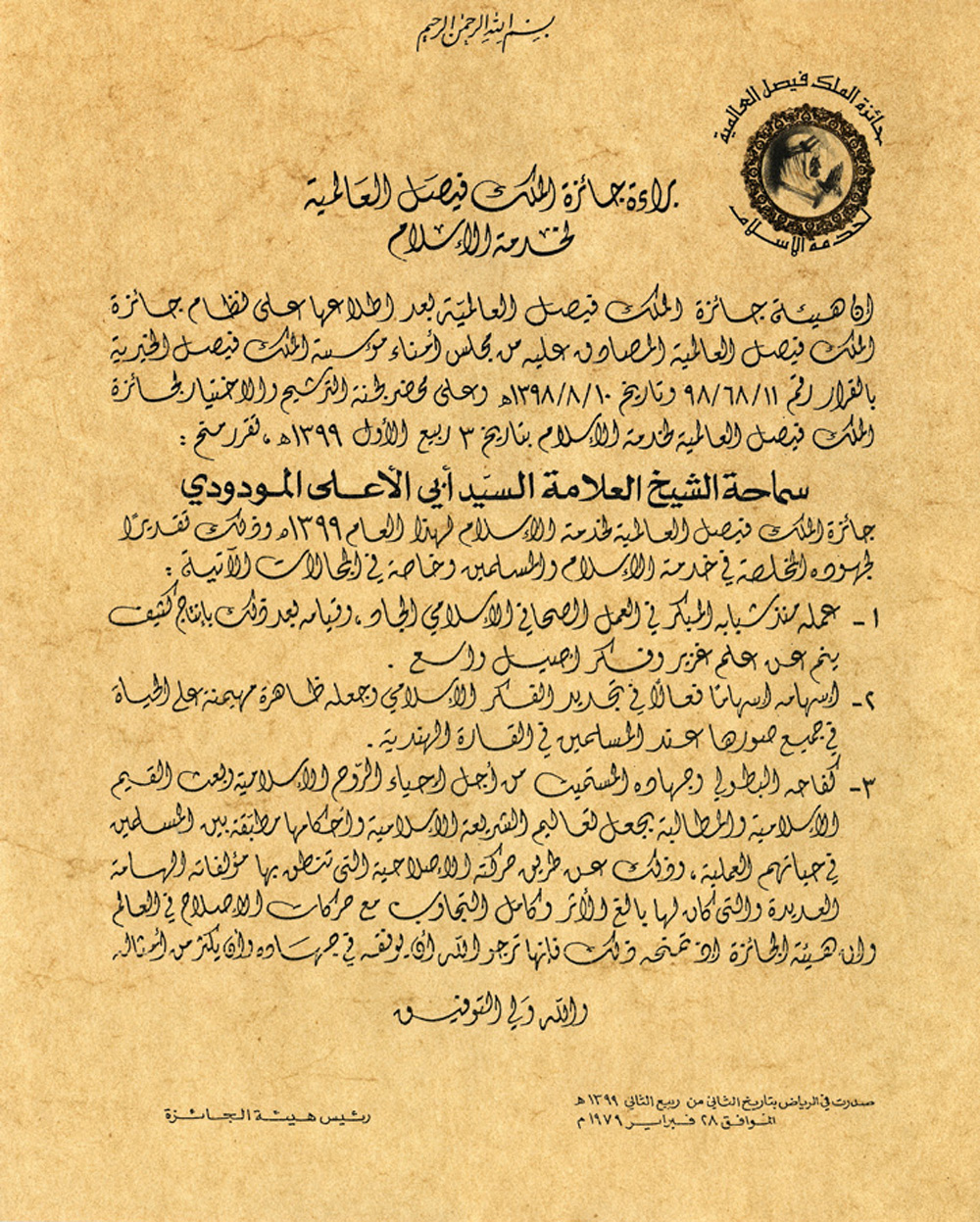

سماحة الشيخ السيد أبي الأعلى المودودي
الفائز بجائزة الملك فيصل في خدمة الإسلام لعام 1979
يجب على كل أمريء القيام بواجباته الدينية بكل ما أوتي من قوة وبكل ما وهبه الله من كفاءات وامكانيات، لتليق بمقام وسمو الدين الإسلامي الذي ننتمي إليه

تلقى علومه الدينية الأولى على يد والده، ثم أكمل دراسته الثانوية في المدرسة الفرقانية حيث لفت الأنظار بذكائه الحاد وتفوقه في الدراسة. وبعد ذلك التحق بكلية دار العلوم في حيدر آباد، ولكنه انقطع عنها عقب وفاة والده واضطراره للعمل لكسب العيش. بدأ حياته العملية بمجال الصحافة وعمره لا يتجاوز خمسة عشر ربيعًا، وكان يكتب مقالاته في صحيفة أردية مرموقة، وفي غضون عامين، أصبح رئيسًا لتحرير مجلة تاج التي كانت تصدر من جبل بور وكتب فيها عدّة افتتاحيات تدعو للمحافظة على الخلافة الإسلامية، كما أصدر في الوقت نفسه كتاب النشاطات التبشيرية في تركيا. وفي عام 1920، انتقل إلى دلهي حيث كلّفته جمعية علماء الهند برئاسة تحرير صحيفة المسلم، ثم صحيفة الجمعيات، واستمر رئيسًا لتحرير الأخيرة لأكثر من عشرين عامًا. وأثناء إقامته في دلهي تعمّق المودودي في دراسة العلوم الإسلامية واللغتين العربية والفارسيّة، كما تعلم الإنجليزية وأتقنها في فترة وجيزة، ممّا مكََّنه من الاطلاع على الآداب الإنجليزية والتاريخ والفلسفة والعلوم الاجتماعية، والمقارنة بين ما تنطوي عليه الثقافة الإسلامية وما تتضمَّنه الثقافة الغربية.
رغم أن المودودي كان صحافيًا بالمهنة إلا أنه اشتهر في أرجاء العالم مفكّرًا إسلاميًا، وداعية إلى التمكين للإسلام، وإعلاء كلمة الحق، والإصلاح الشامل للحياة على أساس إسلامي صحيح، واتخاذ الشريعة الإسلامية دستورًا للحكم. وأصدر – عام 1923 – مجلة ترجمان القرآن الشهرية، التي أصبحـت منبر هداية لمسلمي شبه القارة الهندية. وكان يتولَّى إدارتها وتحريرها بمفرده فيكتب المقالات والافتتاحيات ويرد على أسئلة القراء ويشرف علي طباعتها ومراجعتها وإرسالها إلى المشتركين. نشأت الجماعة الإسلامية في لاهور عام 1941 استجابة لجهود الشيخ المودودي، وكان سماحته أول رئيس (أمير) لها، وغيَّرت تلك الجماعة مجرى الحياة الفكرية لكثير من المسلمين، وأصبحت لها فروع في الهند وباكستان وبنغلاديش وكشمير وسري لانكا. وفي عام 1943، نقل المركز الرئيسي للجماعة الإسلامية من لاهور إلى دار السلام في بتهانكوت. وعند إعلان استقلال باكستان عام 1947، انتقل المودودي إلى باكستان للمطالبة بتشكيل النظام الباكستاني طبقًا لقوانين الشريعة الإسلامية. وظلَّ المودودي أميرًا للجماعة الإسلامية الباكستانية حتى عام 1972 عندما تنحَّى عن رئاستها لأسباب صحيّة.
كان للمودودي بما يملكه من حجة قوية، وقدرة على الإقناع، وثبات على المبدأ، وصلابة في التصدِّي لأعداء الإسلام، فضل كبير في تقوية الجماعة الإسلامية، رغم أنه تعرَّض لمضايقات شديدة وسُجن عدّة مرات بعد قيام دولة باكستان. وفي عام 1953، حُكِّم عليه بالإعدام، فحدث هياج شديد بين أنصاره وتدخل كبار علماء المسلمين مما اضطر السلطات لوقف الحكم والإفراج عنه بعد سجن دام 25 شهرًا ألَّف خلالها عددًا من كتبه.
نُشر للمودودي نحو سبعين مؤلفًا بين كتاب ورسالة وكان من أبرزها كتابه مبادئ الإسلام، الذي ترجم إلى 30 لغة. وبعد ذلك بدأ كتاباته المعروفة بتفهيم القرآن، وهي التي بسط فيها القول عن رسالة القرآن الحقيقية كما أنزلها المولى سبحانه لتغيير الحياة البشرية كافة. أما كتابه “القانون والدستور الإسلامي” فيُعدُّ أول محاولة باللغتين الأوردية والإنجليزية لتوضيح مفهوم تنفيذ الدستور الإسلامي ومجاله وأسلوبه، وهو يضع الأساس الذي ينبني عليه سمو القانون الإسلامي وطبيعة التشريع في الإسلام والمبادئ الأساسية أو المُسلَّمات في الفلسفة السياسية الإسـلامية. إضافة إلى ذلك، فقد صدر للشيخ المودودي العديد من الكتابات التي تتناول الإسلام؛ فكرًا وعملًا.
كتبت هذه السيرة الذاتية في عام استلامه للجائزة.
- توفي سماحة الشيخ السيد أبو الأعلى المودودي في نيويورك بتاريخ 22 سبتمبر 1979 .


